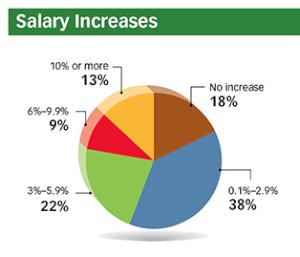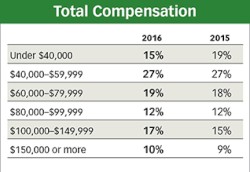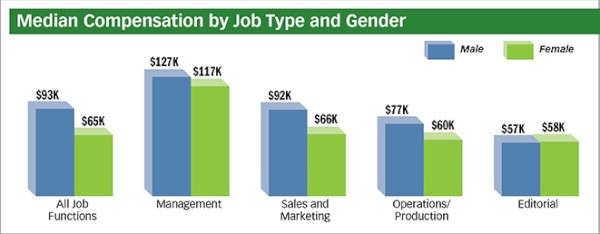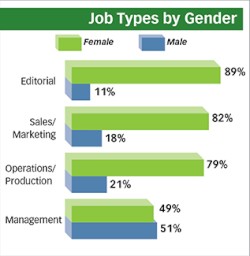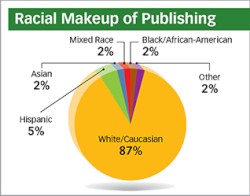Women increased their presence in publishing in 2016. Of the 521 respondents to PW’s annual salary and jobs survey of employees who work at publishing companies, women accounted for 80% last year, up from 74% in 2015.
Fuente original:
The PW Publishing Industry Salary Survey 2017
The increase in women’s share of the industry workforce is not a surprise: for the past several years, the PW survey has found that women are joining the industry at a much faster rate than men. Indeed, in 2016, 85% of respondents with under three years’ experience in publishing were women.
The survey found women accounted for 89% of all editorial jobs last year, up from 84% in 2015, and 82% of sales and marketing positions, compared to 73% in 2015. In operations and production, 79% of respondents were women, up from 67%. It was only in management that women’s share of jobs fell, from 54% in 2015 to 49%.
Managerial positions have traditionally been the highest-paying jobs in the industry, and that was true again in 2016, with the average salary at $129,000. The median salary for men in management was $127,000—$10,000 higher than the median for women. Men also reported higher salaries than women in sales and marketing and operations and production.
The only area in which the median salary of female respondents was higher than that of male respondents was in editorial; there, women averaged $1,000 more than men. Across all job functions, the median salary was $93,000 for men and $65,000 for women—a gap that was actually slightly smaller than in 2015, when the median compensation for men was $96,000 and $61,000 for women.
Even with a slightly smaller wage gap between men and women, low salary was the top job complaint among women, with 60% citing it as a major reason for their frustration at work. For men, however, the top complaint was an increased workload, which was cited by 49% of male respondents to the survey. Low salary was tied with problems with management as the second-most-frequently-cited work issues by men, with 43% of male respondents checking off both those issues (employees could pick as many problems as they wanted).
Lack of advancement was the second-most-often-cited problem by women, noted by 52% of female respondents, and lack of recognition was cited by 45% of women as a reason for frustration with their jobs. Only 38% of men cited those issues as contributing to their unhappiness at work.
Overall last year, the median salary in publishing was $67,000, up from $66,038 in 2015. As in 2015, the most frequently reported compensation range was between $40,000 and $59,999.
The discrepancy in pay between men and women is due partly to the higher concentration of men in high-paying managerial roles and partly to the fact that male respondents tended to have longer careers than female respondents. Among male respondents, 43% had more than 20 years of experience, whereas only 20% of female respondents were in that category. There was an even greater preponderance of women in the group of employees with less than 11 years of experience.
The average pay raise in 2016 was 2.7%, down only marginally from the 2.8% average raise reported in 2015. Here, women did slightly better than men, receiving an average raise of 2.8%, compared to 2.3% among male respondents. As in 2015, the most common pay raise was in the 0.1%–2.9% range.
Looking at Internships
In a new question this year, we asked publishers about their internship policies. Among respondents, 87% said their companies hire interns; 67% of that group reported that their interns are paid. Publishers of all sizes hire interns, but interns at large companies were more likely to be compensated. Only 35% of companies with revenue of less than $1 million reported paying interns, while 58% of companies in the $1 million– $10 million range paid interns. Of employees who worked at publishers that have revenue of between $100 million and $500 million, 81% said they pay their interns.
Editorial and marketing departments are by far the most likely to employ interns. Twenty-five percent of respondents said that their companies hire 15 or more interns per year. The median hourly rate reported is $11.80; 43% of respondents whose companies compensate interns said that they paid $10 to $11.99 per hour.
Diversity
Responses to a question we have included in the survey for three years—on diversity—showed relatively little movement. Once again, the vast majority of respondents were white—87%, compared to 88% in the 2015 survey.
Despite the lack of meaningful change, 37% of respondents thought progress had been made in hiring more people from historically underrepresented groups. On the other hand, 31% of white respondents and 45% of respondents who did not identify as white said no change had been made. (The remaining respondents said they did not know whether strides had been made in improving the diversity of the publishing workforce.)
There was widespread confidence that publishers were releasing more diverse books in 2016. Seventy-two percent of respondents overall, and 65%of respondents who did not identify as white, said they believed the industry was publishing more diverse titles.


